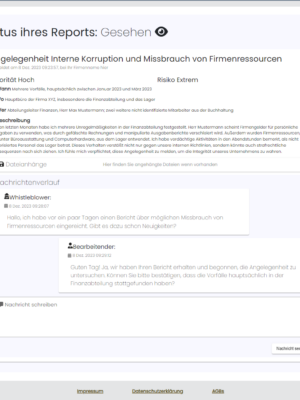Description
Our training course "Data protection in the medical practice" is aimed specifically at medical professionals and teaches them how data protection and information security must be implemented in the medical practice. Participants learn about the most important data protection regulations and their practical application in everyday practice.
Training content
- Introduction and foreword: Confidentiality as a fundamental principle in medical practice
- Personal data in the medical practiceDefinition and meaning
- Basics of data processing: Data protection-compliant processing in practice
- Patients' rightsAccess, correction and deletion of personal data
- Obligations of the medical practice and the doctorLegal requirements and practical implementation
- Practical case studies: Data protection law handling of specific cases in the medical practice
- ConclusionSummary and questions
Data protection basics - training
Our "Data protection basics training" is part of the medical practice training and forms the basis for further data protection topics. This training serves to sensitize your employees to data protection issues and teaches the relevant legal principles.
Contents of the basic training course
- Basics of data protection
- Obligations of the person responsible
- Rights of the data subjects
- Data protection documentation
- Collection of personal data
- Disclosure and transfer of personal data
- Declaration of consent: What must be observed?
- IT security and data security: measures and best practices
- Reporting chain for violations: Procedure and responsibilities
- Sanctions for data protection violations: Risks and consequences
Exemplary excerpts from the medical practice training course
- ConfidentialityPatient data must be treated confidentially and protected against unauthorized access.
- Data securityA reasonable level of security must be guaranteed to prevent data loss or theft.
- Access controlAccess to patient data is restricted to authorized personnel and is based on the need-to-know principle.
- Technical and organizational measuresMeasures to ensure data integrity and confidentiality.
- Privacy policyClearly defined and regularly communicated guidelines and procedures.
- Declaration of consentObtaining patient consent for the use of data outside of medical care.
- Patients' rightsPatients can view, correct and delete their data to the extent permitted by law.
- Data Protection OfficerAppointment of a data protection officer to monitor data protection regulations.
- IT security in accordance with GDPRImplementation of measures such as password protection, firewalls and encryption in accordance with Article 32 GDPR.
- Data transferAgreements on data protection when passing on patient data to third parties, e.g. laboratories or insurance companies.
Why our data protection training?
- Professional competence: Teaching all relevant data protection aspects specifically for medical practices.
- Practical relevance: Case studies and practical exercises.
- Actuality: Taking into account the latest legal regulations.
- Interactive learning methodsExchange and discussion with data protection experts.
Register now to bring your practice up to date with data protection and meet legal requirements!




